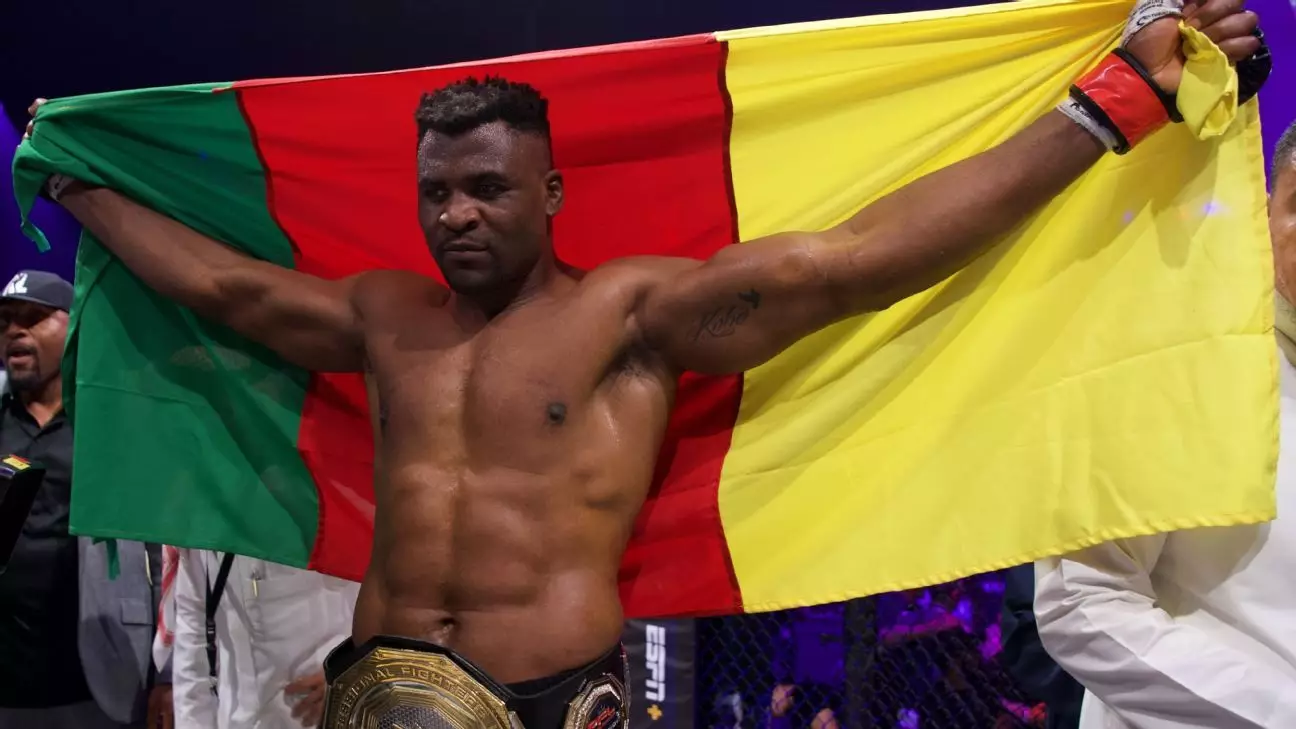Francis Ngannou, a name that resonates deeply in the Mixed Martial Arts (MMA) community, has undergone a significant transformation in the past few years. From a UFC heavyweight champion to now a fighter seeking to redefine his career path, Ngannou recently made headlines with his victory over PFL heavyweight champion Renan Ferreira at the PFL Super Fights in Abu Dhabi. This win marked not only his return to MMA after a challenging two-year hiatus but also signified his resilience in the face of personal tragedy, most notably the loss of his son. Ngannou’s journey encapsulates the struggles and triumphs of fighters who venture beyond the confines of their promotions.
Following his successful comeback, one would expect a warm welcome from the broader MMA community; however, UFC CEO Dana White’s criticisms of Ngannou have suggested otherwise. White’s remarks during a press conference for UFC 308 included suggestions that Ngannou had ducked a fight with current heavyweight champion Jon Jones, thereby attempting to undermine his credibility. This antagonistic relationship raises questions about the dynamics of power within the UFC and how fighters navigate their careers alongside corporate pressures.
In response to White’s comments, Ngannou appeared on Sirius XM Fight Nation’s MMA Today, expressing frustration over White’s continued fixation on him. He argued that White’s attempts to rewrite their history indicate a deeper issue, positing that the UFC CEO cannot let go of their contentious past. “Dana has lost in this situation… and he cannot stand it,” Ngannou asserted, emphasizing the difficulties fighters face when navigating promotions that seem to wield narrative control. The public’s perception of fighters is often shaped by such narratives, making it essential for athletes to reclaim their stories.
Ngannou’s departure from the UFC and subsequent signing with PFL allowed him the freedom to explore lucrative boxing matches that elevated his status, despite losing to prominent figures like Tyson Fury and Anthony Joshua. Ngannou himself noted the financial success he experienced outside the UFC, countering White’s claims that he would have made more money had he stayed. “Now I have made more money than I have ever made in the UFC,” he declared, emphasizing a critical pivot in the discussion of fighter compensation and autonomy.
Financial Independence: A Double-Edged Sword
The discussion around fighter pay is never far from the surface in MMA. Ngannou’s claims that the UFC still owes him money call into question the transparency and ethics behind fighter contracts. While the PFL has offered Ngannou opportunities for financial gain, the lingering financial obligations from his UFC tenure highlight the complications that arise in contract negotiations within the sport. The retention of fighter loyalty through financial incentives has often come at the cost of their independence.
White’s framing of Ngannou’s financial decisions reflects a deeper issue within the sport: the challenge of achieving lucrative results while operating under a promotion that holds significant power over its fighters. Ngannou’s transition to the PFL showcases the potential for fighters to break away from traditionally restrictive contracts, though it also reveals the risks that accompany such a transition. The questions surrounding Ngannou’s earnings highlight the disparity in how fighters are valued and compensated in different promotions.
Amidst the backdrop of financial disputes and promotional tensions, the potential clash between Ngannou and Jon Jones remains a tantalizing prospect for MMA fans. As Jones prepares for a fight against former heavyweight champion Stipe Miocic, Ngannou is positioning himself to capitalize on the opportunity should Jones win. The fervor surrounding a potential cross-promotional fight hints at the burgeoning demand for matchups that capture the fans’ imaginations, rather than being dictated solely by promotional politics.
Ngannou remains optimistic about the prospects of facing Jones, but he acknowledges the role that Dana White will play in determining whether that fight can come to fruition. “The only guy standing in the way of that fight is Dana White,” he reiterated. This assertion of agency serves as a powerful reminder of the importance of fighter representation and the influence of promotional politics on an athlete’s career trajectory.
Francis Ngannou’s journey encapsulates the evolving landscape of MMA, with implications that resonate beyond the Octagon. His story is one of resilience, independence, and the desire for agency in a world traditionally dominated by promotional narratives. As athletes like Ngannou push against existing frameworks, they not only redefine their paths but also challenge the status quo within the industry. The future of MMA will likely depend on how fighters negotiate their autonomy in tandem with the powers that govern their careers, raising fundamental questions about the nature of competition, compensation, and the athletes’ role within the sport.


Leave a Reply